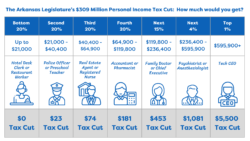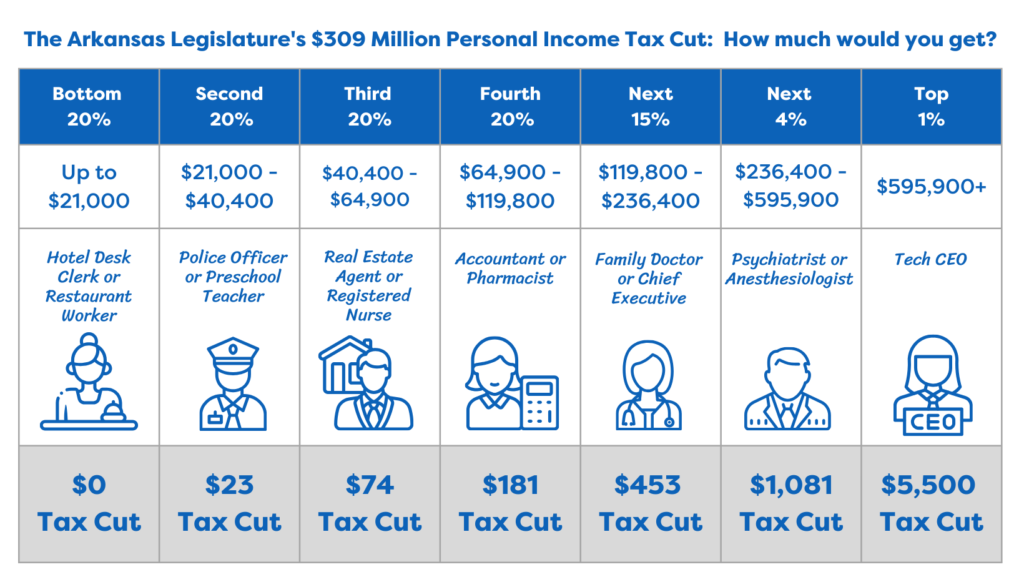
Today the Legislature, in a special session called by the Governor, begins discussion of Senate Bill 1. According to an analysis by the Institute on Taxation and Economic Policy, this bill will eliminate at least $450 million in tax revenue every year from general revenue. This revenue is essential for services important to all Arkansans, such as education and health services. What’s more, this tax giveaway prevents strategic investment in our state to help all Arkansans thrive. We deserve investment from our elected officials, not a race to the bottom.
The proposed legislation this week contains three components:
- A reduction of the top personal income tax rate from 4.4% to 3.9%;
- A reduction of the top corporate income tax rate from 4.8% to 4.3%; and
- An increase in the homestead credit from $425 to $500.
If enacted, wealthier Arkansans will receive most of the tax cuts. In fact, of the $450 million, nearly 75%, or $334 million, goes to the top 20% of Arkansas households by income. What’s more, those households in the top 5%—those making upwards of $236,400 annually—will receive nearly 45% of the tax cut. That’s more than $200 million to just the top 5% earners.
Here’s what Arkansans can expect from the changes found in SB1:

Looking at this another way, the top 20% of households will get 12 times the tax cut in dollars that the other 80% of Arkansas households receive. This is the definition of “regressive,” a technical term describing a tax code that has those making less money pay more in taxes as a percentage of their income. This disproportionate burden on Arkansas workers and families hurts all of us, as it is their hard work and contributions which leads to a thriving economy and state. Instead of additional tax cuts, the state should be investing in programs and services that benefit Arkansans.
The proposed corporate income tax rate reduction is especially troublesome for Arkansans. While this cut totals $99 million of the overall $450 million price tag, it follows a similar regressive pattern. The top 20% of earners will get 77% percent of the benefit. But more importantly, 95% of the tax benefit will go to out-of-state residents. In other words, the Legislature is proposing, through SB1, that the state send nearly $94 million out of the state to non-Arkansans every year.
The increase in the homestead tax credit in House Bill 1002 is the smallest component of the proposed tax changes, decreasing the state’s general revenue by $42 million every year. If homeowners have filed for the homestead tax credit, it will be automatically deducted from their property taxes. The decrease in revenue—funding that could be used for important services—hurts all Arkansans. However, renters do not benefit from the credit, and more than a third of Arkansans live in homes that are rented.
There will be much talk of budget surpluses this week at the Capitol. This should not be the starting point of the budget conversation. Instead, our elective officials should consider innovative strategies to help all Arkansans thrive. Just last week the Annie E. Casey Foundation released its 2024 KIDS COUNT Data Book. Our state ranks 45th in the nation in child well-being. Are our Governor and Legislators happy with this?
Think what we could do for Arkansas children and families with the nearly $2 billion in tax cuts we are already giving away annually. Enough already.
*Analysis by the Institute on Taxation and Economic Policy, June 2024.
